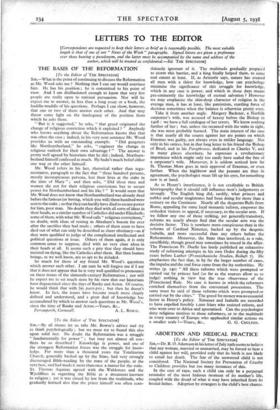[To the Editor of THE SPECTATOR] SIR,—By all means let
us take Mr. Rowse's advice and try to think psychologically ; but we must try to found this also upon solid fact. No doubt the Reformation was a struggle " fundamentally for power " ; but may not almost all con- flicts be so described ? Knowledge is power, and one of the strongest Reformation forces was the struggle for know- ledge. For more than a thousand years the Totalitarian Church, generally backed up by the State, had very strongly discouraged Bible-reading by the mass of the people, at the very best, and had made it more than once a matter for the stake. St. Thomas Aquinas agreed with the Waldenses and the Wycliffites in regarding the Bible as a document inerrant in religion ; yet it was closed by law from the multitude, who gradually learned also that the priest himself was often scan-
dalously ignorant of it. The multitude gradually prepared to storm this barrier, and a king finally helped them, to some real extent at least. If, as Aristotle says, nature has created all men with a thirst for knowledge, how can psychology minimise the significance of this struggle for knowledge, which in any case is power, and which in those days meant pre-eminently the knowledge of eternal salvation ? However we may emphasise the skin-deep character of religion in the average man, it has at least, like patriotism, startling force of decision sometimes when the balance is otherwise pretty even.
Take it from another angle. Margery Backster, a Norfolk carpenter's wife, was accused of heresy before the Bishop in 5428: we have a full catalogue of her errors. We know nothing further of her ; but, unless she recanted with the stake in sight, she was most probably burned. The main interest of the case is that nearly all the counts against her are points on which Erasmus was guilty, not always even in milder language: Not only in his satires, but in that long letter to his friend the Bishop of Basel, and in his Paraphrases, dedicated to Charles V, and in many places elsewhere, he expresses a revolutionary impatience which might only too easily have sealed the fate of a carpenter's wife. Moreover, it is seldom noticed how far St. Thomas More goes in tacit approval of Erasmus, or even farther. When the highbrow and the peasant are thus in agreement, the psychologist must lift up his eyes, for something new is at hand.
As to Henry's interference, it is not creditable to British histriography that it should still influence metes judgements so strongly. The English king did, tardili, what princes and nobles and secular magistrates had been doing for, more than a century on the Continent. Nearly all the desperate Bulls from Rome, appealing for some local monastic 'reform, empower the orthodox visitors to appeal, if necessary, to the secular arm. If we follow any one of those striking, yet generally transitory, reforms we nearly always find that the secular arm was the decisive factor. This is nowhere more conspicuous than in the reforms of Cardinal Ximenez, backed up by the despotic Isabella, and more successful than any others before the Reformation. Moreover, the State thus interfered, as a rule, unselfishly, though greed may sometimes be traced in the affair. The Franciscan Fr. Docile has lately published an exhaustive study of reforming attempts in his own Order during the fifty years before Luther (Franziskanische Studien, Beiheft 7). He emphasises the fact that, in by far the larger number of cases, • the impulse and the real force came from the lay authorities. He writes (p. 540) " All these reforms which were prompted or carried out by princes had (so far as the sources allow us to judge) nothing in view but the true observance of the [Franciscan] Rule. No case is known in which the reformers enriched themselves from the conventual possessions. The same must be said of those reforms which were prompted or carried out by the cities." The greed for money was no essential factor in Henry's policy. Ximenez and Isabella are recorded to have expelled forcibly r,000 friars who resisted reform, and who went over to Africa and apostatised. Can the psychologist deny religious motives to those reformers, or to the multitude in every country of Europe who applauded similar actions on a smaller scale ?—Yours,. &c., G. G. COTJLTON.


































 Previous page
Previous page